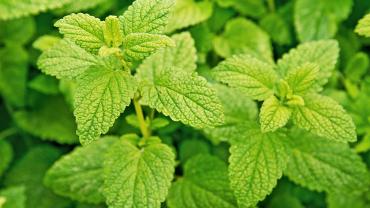
Lemon balm (Melissa officinalis) is an herb in the mint family (Lamiaceae) used to support many aspects of the human body, including a healthy mood, healthy digestion, heart health, and much more. The aerial parts are typically used medicinally and contain flavonoids and polyphenolic compounds, such as rosmarinic acid, terpenes, tannins, and essential oils. Lemon balm is also a pleasant-tasting, lemon-scented plant used in a culinary setting for flavor.
Lemon balm has been shown in research to have sedative, carminative, anti-spasmodic, and antioxidantproperties, and some antiviral activity and effects on cognition and memory. Lemon balm has also been shown to support relaxation through its reported calming effects and its ability to support healthy sleep. In addition, the recent clinical trials described below have further deepened our knowledge of the medicinal uses of this versatile plant.
A double-blind, placebo-controlled, clinical trial randomized 80 individuals with chronic stable angina (CSA) into two groups: a placebo group or a treatment arm group consisting of 3 g lemon balm daily for 8 weeks. The study assessed depression, anxiety, stress, and sleep disturbances in this population. The study found a significant decrease in total sleep disorder score in the intervention arm and a positive impact on all three sleep areas assessed (sleep duration, sleep quality, and sleep efficiency). The treatment arm also experienced significantly lower mean scores of anxiety, depression, and stress.
A randomized placebo-controlled trial assessed both lemon balm and lavender as therapeutic tools in the treatment of agitation among individuals with and without dementia living in residential, aged-care facilities. Participants were given topical essential oils daily for 14 days. Lemon balm was shown to reduce physical, nonaggressive behavior and overall agitation in residents without dementia. Although the study found that lavender was shown to be significantly effective in reducing physical nonaggressive behaviors in individuals with dementia as compared with lemon balm or a placebo, it is important to note that lemon balm essential oil was less well-tolerated in residents with dementia in this study due to its less familiar scent. The results of this study suggest that further research with both lemon balm and lavender are warranted, ideally with an approach that administers the treatment in a blinded setting with clinically relevant dosing.
Lemon balm has been used medicinally for centuries, and pharmacologic studies have validated many of the traditionally known uses. This fragrant and easy-to-grow perennial plant contains dozens of constituents that support human health, and it can be a hearty and helpful addition to any garden.
By Colleen Ambrose, ND, MAT